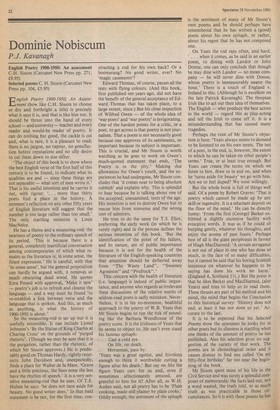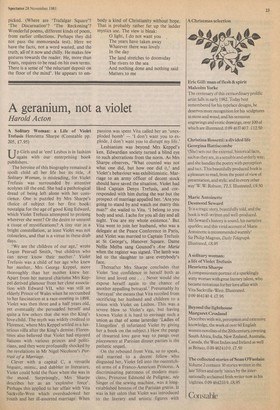Dominie Nobiscum P.J. Kavanagh English Poetry 1900-1950: An assessment C.H.
Sisson (Carcanet New Press pp. 271, £9.95) Selected poems C. H. Sisson (Carcanet New Press pp. 104, £3.95) English Poetry 1900-1950; An Assessment (how like C.H. Sisson to choose so dry and forthright a title) is precisely what it says it is, and that is like him too. It should be thrust into the hand of every school — and university — teacher and every reader and would-be reader of poetry. It can do nothing but good, the cackle is cut and, what is rare, it is a pleasure to read; there is no jargon, no vapour, no genuflection before reputations and no silly desire to cut them down to size either.
'The object of this book is to show where the best English verse of the first half of this century is to be found, to indicate what its qualities are and — since these things are not separable — what sort of men wrote it.' That is his useful intention and he carries it out, with rigour: . more than thirty poets find a place in the history. A moment's reflection on any other fifty years of English literature will suggest that the number is too large rather than too small.' The only startling omission is Louis MacNeice.
He has a theme and a measuring-rod: the nearness of poetry to the ordinary speech of its period. 'This is because there is a general, completely inartificial conversation among contemporaries of which what remains as the literature is, in some sense, the finest expression.' He is careful, with that 'in some sense', but the general proposition can hardly be argued with, it removes so much obscuring dead wood. He quotes Ezra Pound with approval, 'Make it new' — poetry's job is to refresh and cleanse the language — and a way must be found `to re-establish a link between verse and the language that is spoken. And this, as much as anything, is what the history of 1900-1950 is about.'
So the measuring-rod is set up but it is usefully extensible. It can include Lionel Johnson's `By the Statue of King Charles at Charing Cross' on the grounds of 'purged rhetoric'. (Though we may be sure that it is the purgation, rather than the rhetoric, of which Mr Sisson approves.) He is predictably good on Thomas Hardy, rightly resurrects John Davidson and, unexpectedly, finds a place for Walter de la Mare. 'Grave and a little precious, the lines none the less have the rhythm of speech.' It is a very sensitive measuring-rod that he uses. Of T.E. Hulme he says: 'he does not turn aside for beauty. No good writer does.' In that bald statement is he not, for the first time, con structing a rod for his own back? Or a boomerang? No good writer, ever? No 'magic casements'?
Edward Thomas, of course, passes all the tests with flying colours. (And this book, first published ten years ago, did not have the benefit of the general acceptance of Edward Thomas that has taken place, to a large extent, since.) But his close inspection of Wilfred Owen — of the whole idea of 'war poets' and 'war poetry' is invigorating. One of the hardest points for a critic, or a poet, to get across is that poetry is not journalism. That a poem is not necessarily good because one approves of its sentiments, or important because its subject is important. This is crucial, and Mr Sisson is worth watching as he goes to work on Owen's much-quoted statement that ends, 'The Poetry is in the pity.' Making due allowances for Owen's youth, and the experiences he had undergone, Mr Sisson concludes that 'it comes near to being absolute rubbish' and explains why. This is splendid to hear because he is talking about one of the accepted, unexamined, texts of the age. His intention is not to destroy Owen but to rescue him from nonsense and the wrong sort of admirers.
He tries to do the same for T.S. Eliot, preferring the early work (in which he is surely right) and in the process defines the serious intention of this book. 'But the identification of the point of his failure, and its nature, are of public importance because it is not for the health of the literature of the English-speaking countries that attention should be deflected away from "The Waste Land", "Sweeney Agonistes" and "Prufrock".'
This concern with the health of literature (i.e. language) is indeed of public importance, and anyone who regards as irrelevant these discussions of the relative merits of seldom-read poets is sadly mistaken. Nevertheless, it is in his no-nonsense, healthful approach to the poetry of W.B. Yeats that Mr Sisson begins to run the risk of sounding like the Barbara Woodhouse of the poetry scene. It is the Irishness of Yeats that he seems to object to. He can't even stand his famous epitaph: Cast a cold eye On life, on death.
Horseman, pass by.
'Yeats was a great egotist, and frivolous enough to think it worthwhile cutting a figure after his death.' But say we like the figure Yeats cuts for us and, even if sometimes affectionately amused, are grateful to him for it? After all, as W.H. Auden said, not all poetry has to be 'Plain cooking, made still plainer by plain cooks.' Oddly enough, the sentiment of the epitaph is the sentiment of many of Mr Sisson's own poems and he should perhaps have remembered that he has written a (good) poem about his own epitaph, or rather, about his regret that he has not composed one.
On Yeats the rod raps often, and hard: . . . when it comes, as he said in an earlier poem, to dining with Landor or John Donne, one can only conclude that though he may dine with Landor — no mean company — he will never dine with Donne, whose poetry is immeasurably nearer the bone.' There is a touch of England v. Ireland in this. (Although he is excellent on the late Patrick Kavanagh). The thespian Irish like to act out their idea of themselves. The English — who produce the best actors in the world — regard this as play-acting and tell the Irish to come off it. It is a misunderstanding that has caused many tragedies.
Perhaps the root of Mr Sisson's objection is here: 'Yeats always seems to demand to be listened to on his own terms. The test of a poet, in the end, is, however, the extent to which he can be taken on other people's terms.' True, or at least true enough. But Yeats can create the terms on which we listen to him, draw us in and on, and when he 'turns aside for beauty' we go with him. Are we to feel duped? We went willingly.
But the whole book is full of things well said. Of a poem by Robert Graves: 'That is poetry which cannot be made up by any skill or ingenuity. It is a reluctant deposit on the floor of the mind.' He can be directly funny: 'From the first (George) Barker exhibited a slightly excessive facility with evocative words. It was as if he could sit burping gently, whatever his thoughts, and enjoy the aroma of past feasts.' Perhaps best of all is the giant periphrasis in favour of Hugh MacDiarmid: 'A certain arrogance is not out of place in one who has done so much, in the face of so many difficulties, but it cannot be said that his boring Scottish insistence on whatever he happens to be saying has done his work no harm.' (England 4, Scotland 11/2.) But the point is that he likes Barker and MacDiarmid, (also Yeats) and tries to help us to read them. These thrusts are part of his method and his mind, the mind that begins the Conclusion to this historical survey: 'History does not end; at least it has not done so yet.' Accurate to the last.
It is to be expected that his Selected Poems show the spareness he looks for in other poets but its slimness is startling when one thinks of the amount of poetry he has published. Also his selection gives no suggestion of the variety of that work. The poems are in chronological order and it causes dismay to find one called 'On my fifty-first birthday' far too near the beginning of the book.
Mr Sisson spent most of his life in the Civil Service and was surely a splendid com poser of memoranda: the facts laid out, not a word wasted, the truth told, or as much truth as was practicable in those circumstances. So it is with these poems he has picked. (Where are 'Trafalgar Square'? 'The Discarnation'? 'The Reckoning'? Wonderful poems, different kinds of poem, from earlier collections. Perhaps they did not pass the memoranda test). Here we have the facts, not a word wasted, and the truth, all of it now and chilly. He makes few gestures towards the reader. He, more than Yeats, requires to be read on his own terms. There is a sense of 'the reluctant deposit on the floor of the mind'. He appears to em body a kind of Christianity without hope.
That is probably rather far up the ladder mystics use. The view is bleak: 0 light, I do not want you The years have taken away Whatever there was lovely In the day The land stretches to doomsday The rivers to the sea And nothing done and nothing said Matters to me















































 Previous page
Previous page